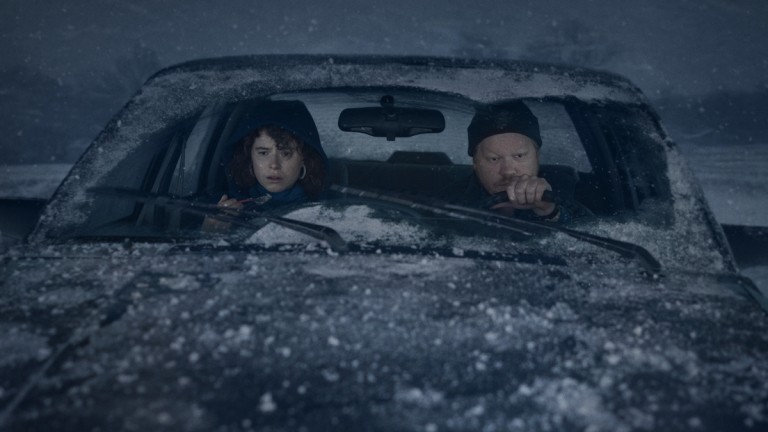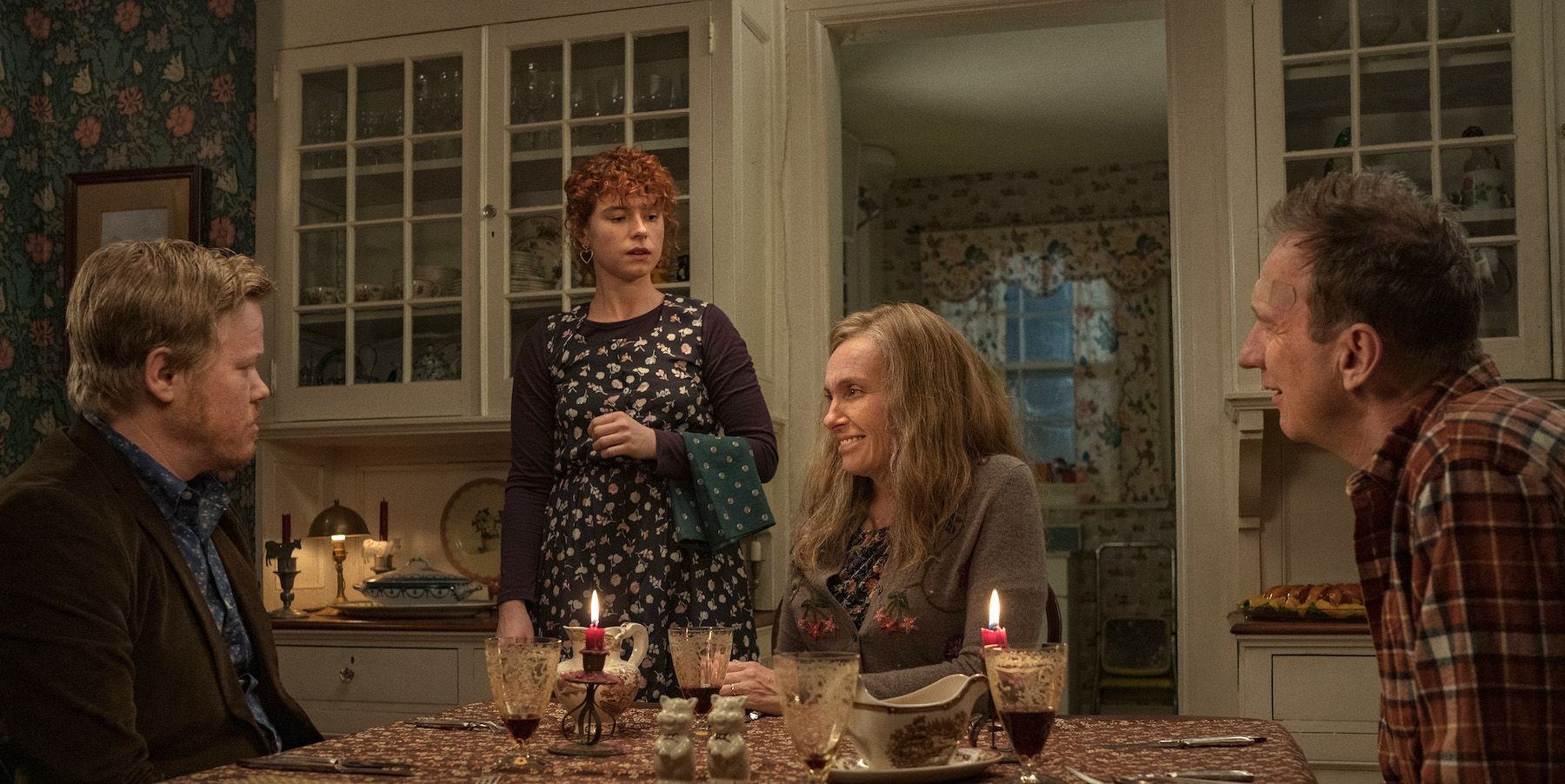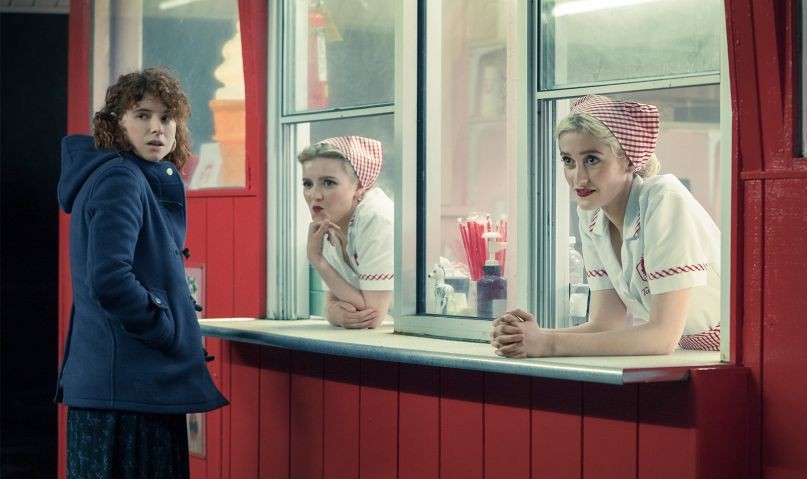
Jessie Buckley and Jesse Plemons in I‘m Thinking of Ending Things.
I recently rewatched an old favorite: Being John Malkovich. The 1999 comedy, written by former sitcom scribe Charlie Kaufman and directed by Beastie Boys video maker Spike Jones, is a surrealist take on the corrosive effects of celebrity culture. It’s a comedy, sure, but that label is somehow too limiting. It’s the height of 90s indie weirdness as a kind of high art.
Kaufman and Jones would reunite for 2002’s Adaptation, which twisted Susan Orlean’s nonfiction bestseller The Orchid Thief into an unrecognizable pretzel. Then Kaufman wrote Eternal Sunshine of the Spotless Mind, which, in the hands of Michael Gondry, became a film on the short list for best of the 21st century.

Awkward! Jake and Lucy meet the parents, Toni Collette and David Thewlis, in one of the most awkward dinner scenes imaginable.
But after the financial crisis of 2008, Kaufman-esque surreality seemed to go out the window. Arthouse and indie films became much more neo-realistic, in part because the mid-budget movie became an endangered species as studio dollars flowed towards megabudget “sure things” based on recognizable intellectual properties. You know, superheroes.
One of the great side-effects of the streaming era has been giving new life to strange voices like Kaufman, and allowing creativity to take flight. One of the earliest examples of this was Spike Lee’s Chi-Raq, a Greek comedy/musical about street violence, which was produced by Amazon. Now Netflix has made a film with Kaufman that simply couldn’t exist in the contemporary Hollywood studio system.
I’m Thinking of Ending Things is, like Adaptation, a loose adaptation of a book — this time, a 2016 novel by Iain Reed. Kaufman doesn’t insert himself into the story this time, but then again, Orleans inserted herself into her narrative of the eccentric Floridian swamp ranger, so it was only fair. That being said, there’s very little about this film that is conventional in any sense.
The story starts on a long car ride through a snowstorm. Lucy (Jessie Buckley) is staring out the window, contemplating how her young relationship with Jake (Jesse Plemons) is unsatisfying. They eventually arrive at his parents farmhouse, where she meets his mother (Toni Collette) and his father (David Thewlis), and the family shares an awkward dinner. Then, as it’s getting late and the snow is piling up outside, Jake and Lucy head back to the city. As they pass a small side road, Jake insists on a detour to see his old high school, over Lucy’s objections.

Ice cream? In a snowstorm?
And that’s pretty much the whole plot of I’m Thinking of Ending Things, but it tells you almost nothing about the film. It is dense, extremely wordy, and at times stubbornly elusive in meaning. Also, there’s a dance sequence.
Buckley excels in one of the most difficult parts you can imagine. Her character’s identity is elusive and ephemeral. Her name seemingly changes again and again. At one point, she does a full-throated impression of legendary film critic Pauline Kael, reciting passages from her review of A Woman Under The Influence. It’s a stunning technical performance.
Plemons’ performance is exceptional. His vacant Nazi enforcer is often overlooked in Breaking Bad, because it’s just another great performance on a screen crowded with them. Here, his gifts are on full display. He even sings songs from Oklahoma! (What is it with the Rogers and Hammerstein thing lately?)

Did I mention the animated sequence?
Kaufman, who also directed, has constructed one of his strangest scripts. It’s almost Becket-like in its mixture of mundane details and slippery symbology. At times it descends into pastiche, sampling texts as strangely disconnected as David Foster Wallace essays and A Beautiful Mind. I’m not going to attempt to explain its meaning. I suspect the writer(s) would insist the attempt to do it for yourself is the point of the exercise. Nor is it a puzzle movie that will click into clarity as soon as you discover and assemble all the clues, although it does have that aspect. The key question to ask if you’re looking at it from that perspective is, who is imagining whom? In that way, it’s about how we construct our identities, and how fragile our mental houses of cards really are.
As a director, Kaufman is a better than average composer of strange images, but his words do miss the visual flash of Gondry and Jones. Ultimately, I’m not sure I’m Thinking of Ending Things comes together in the way that Eternal Sunshine or Anomolisa does. But I have been thinking about it for a couple of days now. It’s a big, sprawling, uncompromising vision from one of our most talented writers. Just don’t go into it expecting to come out with easy answers.
I’m Thinking of Ending Things
I’m Thinking of Ending Things is streaming on Netflix.